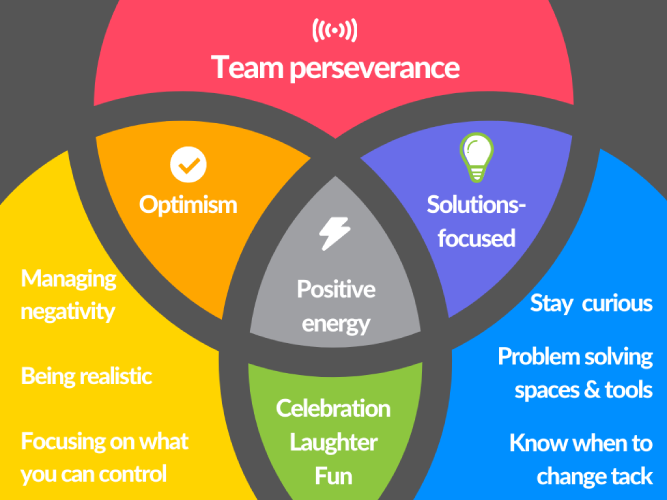What do we mean when we talk about team perseverance?
Staying optimistic, solutions-focused, navigating difficult curveballs and managing emotions within the team all contribute to team perseverance. It’s not all about the negative. Teams which celebrate the good times and enjoy fun and laughter are also those teams who persevere.
How can you nurture more team perseverance?
Protect and nurture team leaders’ optimism
A team draws optimism from their team leaders and managers. What happen when the team leader’s well is dry? How are they supported to bring the optimism? All team leaders need a genuinely safe space and support to work through their own doubts before they can bring it. Creating this safe space for team leaders and managers is crucial.
Exercise realistic optimism
To maintain team optimism, you need to know what their job involves and the real issues they are facing and worried about. We can wish for the best outcome as much as we want but if this doesn’t connect with reality, ambitious visions for a team instead becoming demotivating.
Know what you can control and make a difference in
Teams can find themselves thrown into fraught situations due to external factors (e.g., such as industry changes) which they cannot control. Feeling powerless in such situations can quickly deplete team energy and resilience. Knowing what to persist with and how long is key to deciding how far you take something as a team or let it go when facing a set-back.
Think carefully within your team what you can collectively influence. Resilient, persevering teams work hard to focus on what they can do rather than is beyond their sphere of influence.

Harness humour
No matter how weighty or serious your team’s work is, if you don’t have ways within your team to help you lighten up or if humour is something which doesn’t feature, think again. Moments of fun and humour help a team persevere even in the darker moments. What are the opportunities in your team to have fun, lighten up and cement team connections?
Manage emotional contagion
In difficult times when team energy and motivation is low, negativity can quickly ripple and affect the whole team from only one or two cynical colleagues.
Vital to remember, creating the space for genuine critique is healthy and essential in teams and very different to the contagion of pessimism. The ever-pessimistic teammate always has someone else to blame, quickly highlight past failures or always responds ‘that will never work’ at every new idea.
Be aware of and limit airtime given or your exposure to perennially pessimistic colleagues. You may never change their mind but you can change how much impact they have on you and others.
The art of problem-solving
A team is collective of many assets, perspectives and talents. If a team is to persevere and overcome tough times, spaces where the team can step back, discuss problems, ask questions.
There is a rich array of problem-solving and decision-making tools which teams can use to tackle problems together and bringing out the best in the team’s skills and experience. Think about how you can apply these in your team discussions.
How we about difficulty in our team makes a difference. Rather than stay in the ‘this is dreadful’ space, kickstart solution-focused thinking with curious and powerful team questions such as:
- What’s the first step we could take to fix this?
- What have we done in other situations which has worked before and might help?
- Who else can support our work in this?
- What other inputs would be useful to move this forward?
- What parts of this problem can we explore ideas on together now?
- What could we commit to doing today in our meeting to shift things forward?
To learn more to help your team…
We work with teams to build their resilience and every team is different. For additional information on how team resilience workshops, resilience assessment and coaching could work for your team, click here.
Source: McEwen, Kathryn, Building Team Resilience,(2017)





 '
'